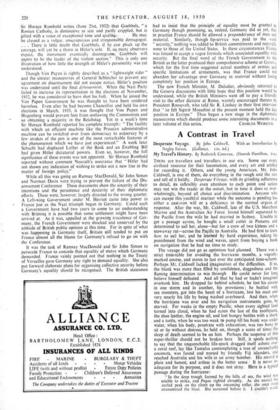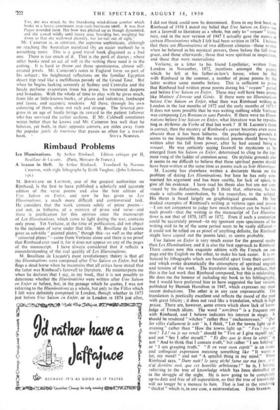A Contrast in Travel Desperate Voyage. By John Caldwell. With
an Introduction by My Travel's History. By Roderick Cameron. (Hamish Hamilton. 2 is.) THERE are travellers and travellers in our era. Some use every civilised resource for their locomotion, and every art and artifice for recording it. Others, and the young American, Mr. John Caldwell, is one of them, do .everything in the rough and the raw and tell of it baldly. Desperate Voyage, with its grinding adherence to detail, its inflexibly even attention to each point and action may not win the reader at the outset, but in time it does so over- whelmingly, beyond all choice and discrimination. Anyone who can escape this youthful mariner while the outcome is pending has either a cast-iron will or a deficiency in the normal organs of response. After the war, Mr. Caldwell, late of the U.S. Merchant Marine and the Australian Air Force, found himself separated by the Pacific from the wife he had married in Sydney. Unable to get a passage across, he bought a small cutter in Panama and determined to sail her, alone—but for a crew of two kittens and a stowaway rat—across the PaFific to Australia. He had first to learn how to sail her, and he learned by hard experience, taking his punishment from the wind and waves, apart from buying a book on navigation that he had no time to study.
The voyage did not go as optimism had planned. There was a strict time-table for avoiding the hurricane months, a vaguely- marked course, and stores to last over the anticipated time-scheme. Perhaps Mr. Caldwell lacked imagination of the difficulties. If so, the blank was more than filled by confidence, doggedness and the flaming determination to win through. He could never for long believe himself defeated. And all that he had or hadn't imagined overtook him. He dropped far behind schedule, he lost his course in one storm and in another, his provisions ; he battled with sea monsters, got into the heart of a hurricane, lost his mast and very nearly his life by being washed overboard. And then, when the hurricane was over and his navigation instruments gone, he starved. For weeks in the empty Pacific, when every sighted land turned into cloud, when he had eaten the last of the toothpaste, the shoe leather, the engine oil, and lost hungry battles with a shark and a turtle, when he was too weak tb pump till his bunk was under water, when his body, prostrate with exhaustion, was too bony to sit or lie without distress, he held on, though a score of times the sleep of death seemed to be on him. Perhaps the suspense of this super-thriller should not be broken here Still, it spoils nothing to say that the unquenchable life-spark dragged itself ashore over a coral reef, lay like Tantalus contemplating a tree of unreachable coconuts, was found and nursed by friendly Fiji islanders, and reached Australia and his wife in an army bomber. His record is plain and honest, and artless in the better sense.• It is never in- adequate for its purpose, and it does not stray. Here is a typical passage during the hurricane: " In the deep trough formed by the hills of sea, the wind was unable to strike, and Pagan righted abruptly. As she neared the curled peak on the climb up the oncoming roller, she once more encountered the blast. She careened before it. T couldn't stand. Too, she was struck. by the thundering wind-driven comber which broke in a heavy continuum atop each hurricane swell. It was then Pagan pounded most. Her bow was pitched up-as though dynamited, and she yawed wildly until heavy seas, boarding her, weighted her down so that she wallowed clumsily, her lee-rail out of sight." Mr. Cameron is, in contrast, the supreme sophisticate, although on reaching the Australian mainland (by an easier method) he is something more. This is a good travel book ..disguised as a bad one. There is too much of it. That is the peril,of diaries ; where other books need an act of will in the writing these need it in the cutting. It is hard to throw out those spontaneous, almost self- created jewels. Mr. Cameron's notes in England form no part of his subject ; his heightened reflections on the familiar Egyptian desert trip read like a mellifluous parody of the Grand Tour. But when he begins looking seriously at Sydney and Centralia and the heady perfume evaporates from his prose, his treatment deepens and broadens. With the whole of time to play with he gives much, from life or little-known books, of places and industries, landscape and fauna, and eccentric residents. All these, through his own colouring of them, shine out rich. and strange. The leisured pro- gress in an age of hustle brings its reward to the patient follower who has survived the earlier sections. If Mr. Caldwell sometimes writes better than he knows and Mr. Cameron less well than he believes, yet both, in their opposite corners, are miles away from the popular guide de tomirme that passes so often for a travel-



































 Previous page
Previous page